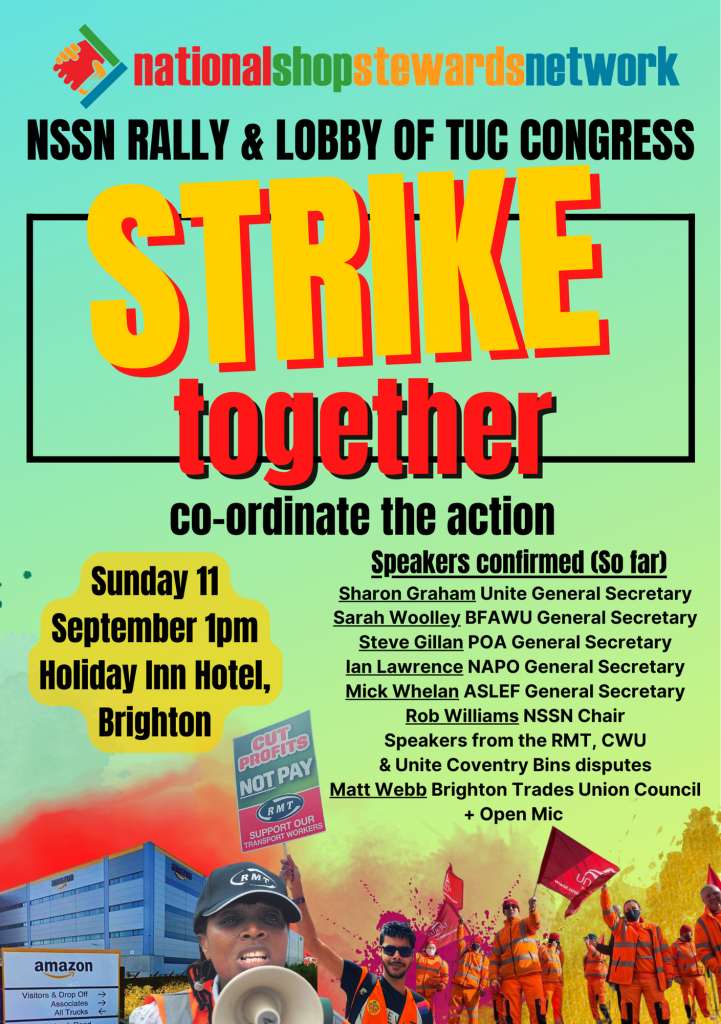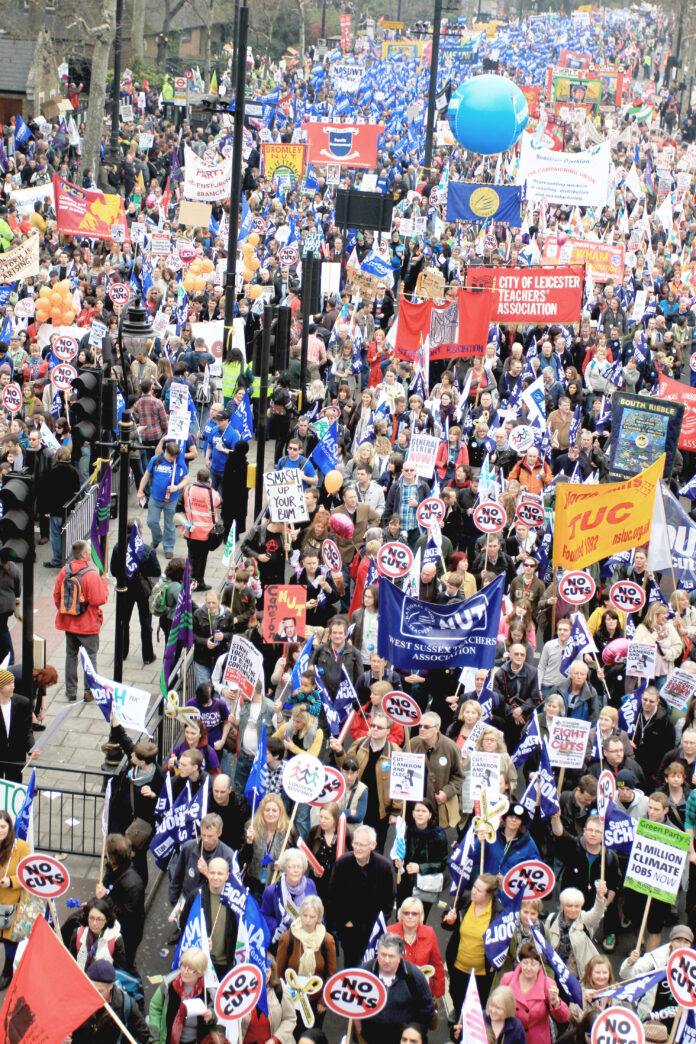What we think
Not for decades has the Trades Union Congress (TUC) met at such a critical time for the trade union movement.
Eleven years ago, Congress took place as the Tory/Lib-dem coalition government unleashed its austerity offensive, with public sector pensions in its sights. 29 public sector unions came together during that week to coordinate strike ballots, leading directly to the two million-strong ‘N30’ strike of November 2011. That struggle has huge lessons for trade union reps and activists, in what steps need to be taken now, and how the fight needs to be waged.
The struggle today is even sharper than in 2011. Undoubtedly, the attack on workers’ living standards is even more generalised, as the cost-of-living crisis hits. RPI inflation is over 12%, and is estimated to be in excess of 20% next year. Energy prices had already increased by over 100% for many workers before the latest announcement that the energy cap will rise by a further 80%.
Workers increasingly have no choice but to fight. The strike wave that has been steadily building over the last year is accelerating. Most of the action has been localised, with Unite reporting that over 70,000 of its members have been involved in over 300 disputes. Bus workers have been to the fore as well as bin workers, in which the GMB have also been prominent.
Nationwide action
But what has been a game changer is the national strike action on the railways, in BT and now Royal Mail during this ‘hot summer’, taken by members of RMT, Aslef, TSSA, Unite and CWU. The high points of the struggles have been: 21 June, when 50,000 RMT members walked out together on Network Rail, the Train Operating Companies and London Underground; 31 August, when 155,000 CWU members went on strike across Royal Mail and BT. The Unite dock strike at Felixstowe, which handles about half of the UK’s imported shipping containers, is also of huge significance.
This has all raised the prospect of national coordinated strike action across all sectors against the cost-of-living squeeze and the crisis-ridden Tory government. As we go into autumn, public sector unions are moving towards national strike ballots. It is indicative of the mood of anger, and the layers being radicalised, that the first NHS union to ballot is the Royal College of Nursing, traditionally opposed to striking. Similarly, barristers in the Criminal Bar Association have voted by 80% to escalate their dispute, with their action going indefinite on 5 September – the same day the winner of the Tory leadership contest is announced.
The unions are becoming a pole of attraction for all those facing the crunch, even more so in the absence of a fighting political alternative, given Keir Starmer’s moving of Labour further and further to the right. This isn’t an argument for the unions to turn away from politics, whether that be in Westminster or the local town hall. The reports that the cost-of-living campaign group ‘Enough is Enough’ has signed up 500,000 supporters in weeks, shows the huge potential if the unions were to launch a political vehicle that stands with workers and fights on a socialist, anti-austerity programme, including the renationalisation of the energy companies (supported by nearly half of Tory voters), utilities, railway and transport companies, as well as the likes of Royal Mail and BT. Such a party would lift the confidence of workers and strengthen the struggle.
Growing anger against the Tories could mean Starmer’s New Labour winning the next general election. But Starmer has made it clear that he doesn’t act in the interests of the working class. In such a situation, the existence of a new workers’ party – even with a handful of MPs – would be a vital political weapon in the hands of workers.
Those attracted by the fighting capacity of unions include workers not organised at this stage. Over the last few years, unions have been plugging away trying to organise among Amazon workers. But when their anger exploded at the insulting ‘pay offer’ of between 35p and 50p per hour, following the example of rail workers, they walked off the job. The prospect of building fighting union organisation among Amazon’s 75,000-strong UK workforce is now within reach. The same goes for other non-union employers.
On picket line after picket line, the idea of workers striking together is met with total agreement. Workers understand that coordinated action would maximise their power and strength, particularly in the national disputes. A number of unions will be moving motions at the TUC calling for it to organise coordinated action. But a concrete plan is needed.
Determined escalating action
The Tory government is weak and divided, and can be defeated. But that doesn’t mean victory is certain. The one thing that Britain’s capitalist class is united on is the need to make the working class pay for this crisis. To win, the workers’ movement needs determined action. That could mean escalating strikes in specific disputes, especially those of a national character. Therefore, the TUC should launch an appeal to build a massive strike fund to assist those unions on the front line, such as the CWU and the RMT. It also means a plan to coordinate.
The National Shop Stewards Network has again called a lobby of Congress, as it opens on Sunday 11 September, on the theme of: ‘Striking together: Co-ordinate the action’. It calls on the unions to do what they did in 2011, draw up plans to bring together ballots and action. But this time, to continue the fight to the end.
This would mean each union, in the public and private sectors, setting out its proposed ballots and strike action. Given the stage of most public sector unions’ disputes, this poses action towards the end of autumn on an even greater scale than the N30 strike. But days of significant coordinated action can be called that build towards that. In 2011, there were escalating strike days called throughout the year, incorporating a growing number of unions, building the action.
If the national strikes on the railways, Royal Mail and BT were coordinated with the localised disputes, up to a quarter of a million workers could be involved. This would have a huge effect on the confidence of public sector workers getting ready to vote in national strike ballots.
Make 19 October count
The TUC has called a lobby of parliament on Wednesday 19 October against the cost-of-living crisis. It has begun to publicise it – but the plan still seems to be a small targeted lobby of MPs. Instead what is needed is a serious campaign to make the day a mass march on Parliament. Let’s flood the streets of London with workers, both those in dispute and those looking to take action, and everyone who is angry at the cost-of-living crisis.
It would be seen as a vital step in upping the ante against the Tories and the employers, and a platform to fight for mass coordinated strike action. It should also issue a promise to the new Tory leader that any further anti-union measures would result in a 24-hour general strike. This is the programme of action that needs to be set out by Congress. Escalating action, up to and including a 24-hour general strike, is posed in the next weeks and months. It is the fighting unions and growing number of rank-and-file union activists that must act as the lever to make it happen.









